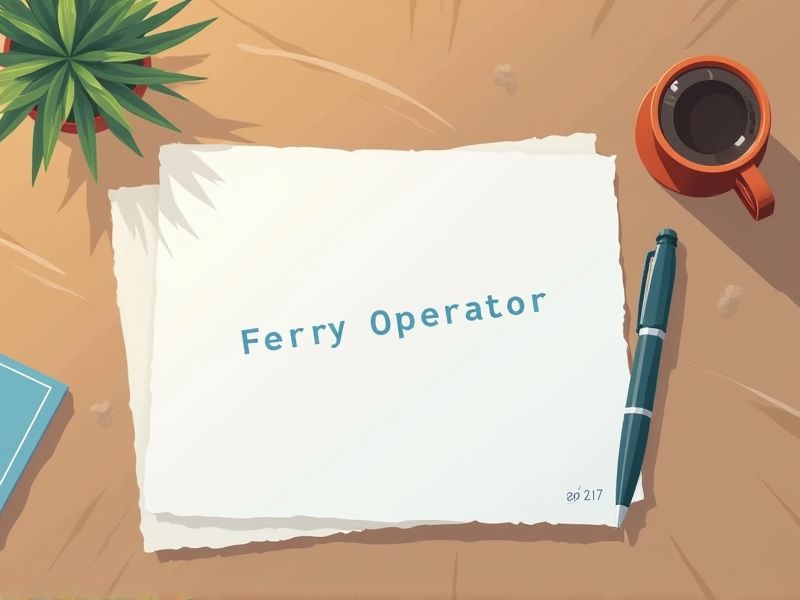
Ferry operators handle the safe transportation of passengers and vehicles across water bodies, requiring a comprehensive understanding of maritime operations. Certifications ensure they possess critical skills in navigation, safety protocols, and emergency response to prevent accidents and ensure safety. Regulatory bodies mandate specific certifications to standardize competencies across the industry, minimizing risks associated with water transportation. These are some vital certifications required for anyone aspiring to become a ferry operator.
Merchant Mariner Credential (MMC)
The Merchant Mariner Credential (MMC) is necessary for ferry operators because it verifies their expertise and qualifications to ensure safe operation of maritime vessels. By holding an MMC, ferry operators meet the stringent standards set by regulatory bodies, which reduces the risk of accidents. The credential provides legal documentation that the operator has completed required training and certifications, which facilitates compliance with maritime laws. Without an MMC, ferry operators lack the formal recognition of their skills, potentially compromising passenger safety and operational integrity.
STCW Basic Safety Training Certificate
The STCW Basic Safety Training Certificate ensures that ferry operators possess the necessary skills to handle emergencies such as fire, abandonment, and medical situations on board. Compliance with international maritime regulations mandates that operators are adequately trained, promoting safety for passengers and crew. Acquiring the certificate also equips operators with proper knowledge of survival techniques and emergency protocols, reducing the risk of accidents. Ferry operators without this certification may face impediments in employment opportunities, as most maritime companies require this standard qualification.
Passenger Ship Familiarization Certificate
The Passenger Ship Familiarization Certificate ensures ferry operators understand crucial safety procedures, impacting overall passenger safety. It mandates knowledge of emergency equipment use, effectively influencing successful evacuation during crises. This certification requires crew to comprehend ship layout and safety protocols, minimizing risks associated with human error. Regulatory bodies enforce this certification to maintain consistent safety standards across all passenger vessels.
Navigation and Bridge Resource Management Certificate
The Navigation and Bridge Resource Management Certificate enhances a ferry operator's ability to safely navigate complex waterways. By acquiring this certification, operators are trained to effectively manage bridge team coordination, reducing the risk of human error. It equips operators with vital decision-making skills, particularly in high-pressure or emergency situations on ferries. Regulatory requirements often mandate such certifications, ensuring that ferry operators adhere to international safety standards.
Marine Radio Operator Permit (GMDSS)
Ferry operators often traverse international waters, requiring compliance with regulations that mandate a Marine Radio Operator Permit (GMDSS). This permit ensures operators are trained in using the Global Maritime Distress and Safety System, critical for effective emergency communication. Holding the permit facilitates adherence to international maritime laws and helps prevent potential fines or operational shutdowns. Proper communication protocols help ensure passenger safety by enabling rapid response to distress situations at sea.
First Aid and CPR Certification
Ferry operators need First Aid and CPR certification because in emergencies, they are often the first responders on water vessels, where medical help may be delayed. Training in these skills ensures they can handle situations like choking, cardiac arrest, or injuries passengers might experience. Ferry operators commonly work in environments where accidents, like slips or falls, are more likely, necessitating immediate assistance. Certification boosts passenger trust and ferry companies' reputational reliability in providing a safe travel experience.
Emergency Evacuation Procedures Certification
Ferry operators need Emergency Evacuation Procedures Certification to ensure passenger safety during unforeseen incidents. Certification equips staff with the skills to manage crowd control effectively, reducing panic and potential injuries. Regulatory bodies often require this certification to comply with safety standards and legal obligations. The training ensures a coordinated and efficient response, minimizing evacuation time and enhancing overall security.
Crowd Management and Passenger Safety Certification
Ineffective crowd management on ferries can lead to dangerous overcrowding, increasing the risk of accidents or injuries. Certification ensures operators are trained to efficiently handle emergency situations, safeguarding passenger safety. Regulatory compliance is a driving force, as authorities mandate certifications to adhere to legal safety standards. Certifications also enhance public trust, ultimately resulting in higher ridership for operators.
Environmental Awareness and Compliance Certification
Environmental Awareness and Compliance Certification is crucial for ferry operators to ensure adherence to regulations that protect marine ecosystems. Non-compliance can lead to significant legal penalties and potential operational shutdowns, impacting financial stability. Certification typically results in improved operational efficiency and reduced environmental footprints, contributing positively to company reputation. Consumers increasingly prefer environmentally responsible operators, influencing market competitiveness and demand.
Hazardous Materials (HAZMAT) Awareness Certification
Ferry operators often transport hazardous materials, and HAZMAT Awareness Certification ensures they understand associated risks and safety protocols to prevent accidents. Regulatory compliance is mandatory, and certification demonstrates that operators meet legal requirements for handling such materials. Certification provides ferry operators with knowledge to identify hazardous substances, reducing the likelihood of spills or contamination incidents. Proper awareness and training can enhance passenger and crew safety, ultimately protecting human lives and the environment from potential harm.
Summary
When you choose a ferry operator with certifications, enhanced safety becomes evident as these operators adhere to stringent safety standards. Operational efficiency improves because certified operators are trained to optimize resource use, leading to punctual services. Customer satisfaction tends to rise as compliance with quality benchmarks ensures a better travel experience. Certified operators also attract more passengers since the certifications enhance credibility and trustworthiness.
